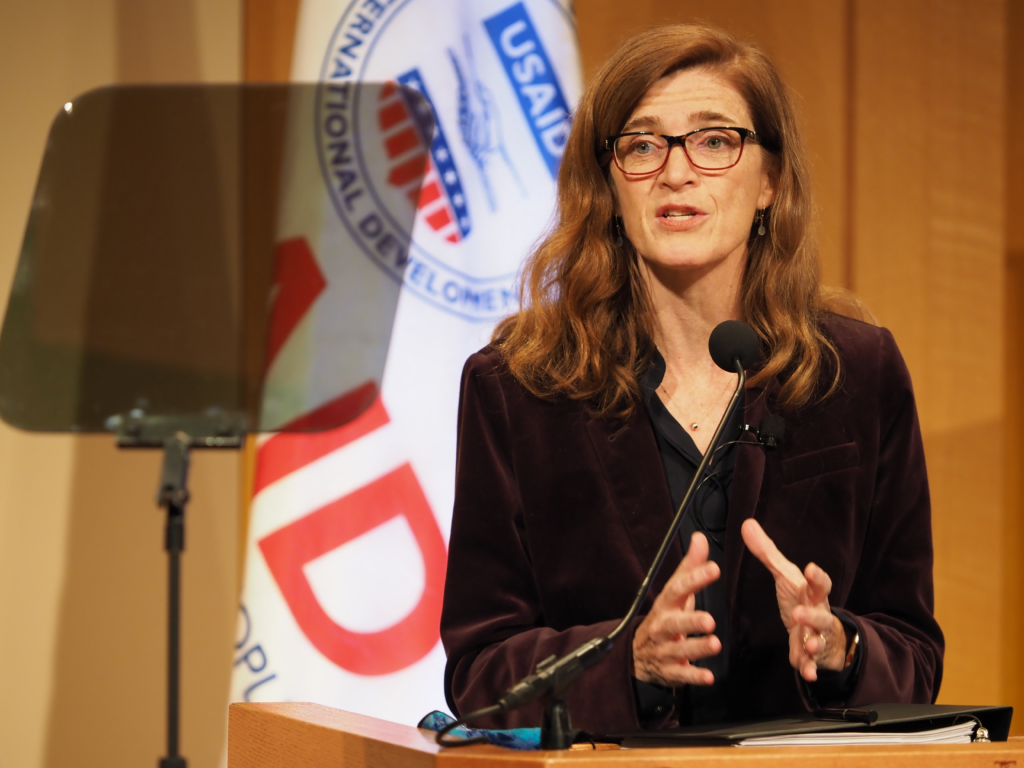Making U.S. foreign aid more accessible, equitable and responsive is the top priority for the U.S. Agency for International Development (USAID) moving forward, USAID Administrator Samantha Power said at a Nov. 4 event.
The in-person event, titled “A New Vision for Global Development with USAID Administrator Samantha Power,” was hosted by USAID, the Walsh School of Foreign Service, the Global Human Development Program, a graduate program at Georgetown University focused on international development, and the U.S. Global Leadership Coalition, a nonprofit organization that advocates for a strong international affairs budget and promotes America’s international affairs programs in U.S. foreign policy.

USAID, which has worked to combat infectious diseases, reduce extreme poverty and advance democratic and economic institutions around the world, was created in 1961 following the passage of the Foreign Assistance Act of 1961. The Nov. 4 event also served as a celebration of USAID’s 60th anniversary.
In addition to continuing to focus on the organization’s key objectives, USAID will also place a greater focus on increasing accessibility and equitability in their work, according to Power.
“We will make aid more accessible to people and organizations who want to participate,” Power said at the event. “We will make it more equitable in terms of the impact it will have on the ground. But when I say we need to make aid inclusive, I also mean we need to listen to what our partner nations actually want. Across all of our programming, we have a real opportunity to make our aid more responsive.”
Working with local business leaders and organizations is imperative to ensure thorough and long-lasting economic and humanitarian outcomes in their countries, according to Power.
“When we partner with these local NGOs and businesses, we have an opportunity to double our impact, to not just manage a project and deliver results, which is important, but to grow the local capacity of that business or organization so its impact can be sustained long after its relationship with USAID ends,” Power said.
As part of efforts to partner with local businesses and organizations in countries receiving aid, USAID also launched WorkWithUSAID.org Nov. 4. The website serves as a resource hub that provides information on how to partner with USAID that aims to increase the accessibility of collaboration with the organization.
Partnerships with local NGOs and companies help ensure aid helps reach more people around the world, according to Power.
“It is crucial that we engage more frequently and more intensely and sustainably with the broader range of partners that I mentioned, as they offer a scale that no single development agency can truly reach. So we have to lower barriers for these kinds of organizations and institutions to join our mission,” Power said.
In addition to programs like WorkWithUSAID.org, USAID has also launched initiatives addressing the effects of climate change in underdeveloped countries. The Scaling Up Renewable Energy (SURE) initiative works with underdeveloped countries to transition to clean energy. The Strengthening Utilities and Promoting Energy Reform (SUPER) initiative works to ensure equitable access to power while promoting renewable energy.
Initiatives like SURE and SUPER will help address a wide range of issues related to the impacts of climate change, according to Power.
“We will help support more than 500 million people to adapt to climate change through efforts like scaling drought-tolerant agriculture, establishing early warning systems for storms and creating new insurance schemes that can support people when their harvests fail or their livestock perish,” Power said.
In all of its programs and initiatives, USAID will utilize economics and behavioral science technology to track the impact and ensure efficiency of their projects, according to Power.
“We want to make sure that we are deploying the latest insights in economics and behavioral science to make sure our programs have the impact on underserved communities that we truly intend for them to have,” Power stated.
According to Power, USAID’s current work and initiatives represent the culmination of the agency’s 60 year history.
“Today, Americans should know that for 60 years USAID assembled some of the brightest, most dedicated and most effective public servants in the world, and they can take pride in the impact that American generosity is having on people in need around the world. That is the agency I feel so privileged to run,” Power said.




















